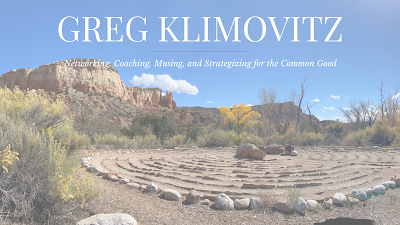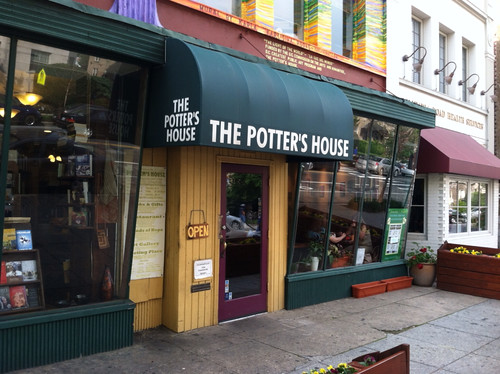The Imago Dei Youth Ministry pilgrimaged alongside the faithful at The Potter's House in the summer of 2009, a small church community that is an extension of the life and witness of Church of the Saviour in Washington, D.C., to learn about their emphasis on vocation and call, commitment to church membership, incarnation of mission groups that have transformed the Adams Morgan section of D.C., their love for God, solidarity with their poorest neighbors, and interest in honest conversations about theology and culture over delicious home cooked meals. I am not a seasoned traveler; however, there are a few places I have ventured to that I now consider sacred. They are more or less monuments along my pilgrim road. After that summer's immersion experience, The Potter's House quickly became one such sacred place to be remembered with stories to be retold. That said, breakfast at this small church/bookstore/coffee house/worship space/extension of community to the homeless populous was the perfect way to set the tone for a day saturated in collaboration and critical reflection about the church, youth ministry, and God's dreams for the world. [Read more about The Potter's House and Church of the Saviour]
Hear the words of the late member and writer for Church of the Saviour, Elizabeth O'Connor:
Speaking of thinking out loud, here are a few reflections from yesterday's and today's conversations , keynote speakers, and workshop leaders at CYNKC :"An average of thirty ministers visit us each month. many bring with them their lay leaders and young people's groups. Most come because they are grappling with the problem of the renewal of the Christian Church in our time. Some feel imprisoned in their million-dollar structures, smothered by organization, their energies sapped by committee meetings and building drives and membership campaigns. Others bring friends because the coffee house helps them communicate what cannot be said wholly in words. They know that the answer does not lie in a coffee house for every church, but they feel that there is something comparable for their church in its peculiar situation, and in the Potter's House they find the inspiration and encouragement to think aloud" (Call to Commitment, 120)
Monday, May 7
One of the more significant presentations was delivered by Dixon Kinser, an Episcopal priest and father of an autistic child, who spoke of the urgency of youth and children's ministry to talk about and foster a community of welcome and embrace of youth on the autistic spectrum. Kinser reminded us that youth on the spectrum have the same access and ability to contribute to the kingdom of God as any other youth within our faith communities. Granted, there are unique challenges and intricacies that may require us to adapt and adjust, yet youth ministries must be willing to engage the uniquesness of these students so to incoporate their gifts, talents, questions, and concerns. As a youth pastor who has worked with many youth on the autistc spectrum, I was both grateful for and humbled by this conversation, aware that in many ways I have assumed awareness only to embody ignorance.Mike King, Editor of Immerse Journal and President of Youthfront, also offered a compelling address. In a transient culture obsessed with the "propensity to move on to the next thing," King called for pastors and ministry directors to curate longevity, to "stay" where they are, and to make displacement the exception versus the norm. In other words, the church in the emerging culture must reclaim a sense of call to a particular context and serve there long enough to learn the community, love the people, and incarnate fresh expressions of God's kingdom within the neighborhood that has become one's own. However, too often youth ministers are assumed to only be in a particular context for a short season before they are called up and out of that place, away from those students, and on to "real" minsitry in a new place, that is, until something better comes along. I could not help but think of Jeremiah:
Tuesday, May 8Thus says the Lord of hosts, the God of Israel, to all the exiles whom I have sent into exile from Jerusalem to Babylon: Build houses and live in them; plant gardens and eat what they produce. Take wives and have sons and daughters; take wives for your sons, and give your daughters in marriage, that they may bear sons and daughters; multiply there, and do not decrease. But seek the welfare of the city where I have sent you into exile, and pray to the Lord on its behalf, for in its welfare you will find your welfare (29:4-7).
I will say, I was not prepared for the amount of exposure to children's ministry this week. However, as a father of two one-year old twins, I have an increased interest in how God is using creativity and ingenuity within this vital component of church life, spiritual formation, and missional witness. The consistent message the past two days has been the power of story and the subversive nature of gospel as narrative. This is particularly the case as we seek to tell and retell the sacred stories to children and youth so to foster a concern for peace, justice, love of creation, and a concern for the poor as underscored by Scripture. Furthermore, the emphasis has been on the need to move beyond the impartation of information and towards the inclusion of youth and chidlren as significant contributors to and co-creators within the congregation and related witness. I have also learned that it is possible to have simple yet rich children's ministry music and curriculum that allows kids and youth to learn about and playfully engage God's dreams for the world.
A few other highlights:
- Tony Campolo's reading of a letter to his granddaughter whereby he challenged her to learn to find herself as she extends herself to others
- The Wallis Family's sharing of the need for families to reclaim their unique Christian identity, which reframes the PTA as parish and the baseball field as altar.
- John Westerhoff's reminder that we do not build the kingdom of God, rather abide within it; "the opposite of faith is not doubt but certainty;" and the call to organize around gifts and needs versus compartamentalized demographics, e.g. middle school, high school, etc., so to move towards cooperative leadership and mutual learning that transcends generational divides. However, his best statement was that catechesis stems from the Greek, "to echo," which in turn moves education from mere instruction and towards the echoing of Jesus' teachings, stories, and kingdom ethics.


